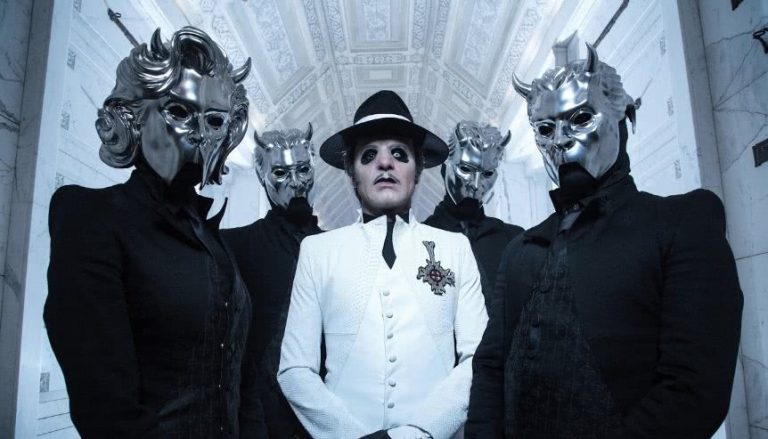In the final act of The Wizard of Oz, the rag-tag group of protagonists finally encounter the titular character – or, at least they think they do. What appears to be a large, ominous figure is, in fact, an operation from behind a curtain that’s revealed to be just a mere man. In 2007, Ghost – a Swedish metal band that had thrived on anonymity and secrecy behind its band members – had its own Wizard of Oz moment. The man behind the entire operation was revealed to be one Tobias Forge, who had played the role of frontman Papa Emeritus from the band’s 2008 inception up to that year – although his outing was not voluntary. The naming of Forge came out in a legal battle concerning Ghost, in which former members claimed he had attempted to retroactively claim the band entirely as his own.
“It was dirty laundry,” begins Forge. “Of course, any break-up or divorce is uncomfortable, but it needed to happen. There was clear writing on the wall for a long time – it had to happen. It didn’t have impact on the creative process whatsoever – it was never on anyone else’s shoulders to create anything for the band. I had been working on Ghost 24/7 before any of them had ever even played a single note on-stage. From a practical point, it didn’t hinder the band – but it obviously did from a social standpoint. I made a cardinal fault by involving my friends in this. That was not smart.”
For those that missed it, essentially the suit from Forge’s former bandmates alleges that the vocalist withheld financial information and rights to royalties from both album sales and live performances. While legally Forge cannot comment directly on the case itself, he does continue by elaborating on his perspective. “As a boss and a team leader, you should hire people on the grounds of their ability – not their proximity,” he says.
“That is something I have had to learn the hard way. This band has come at the expense of a few friendships, and that truly breaks my heart. I had to make a decision – and by the time that I did, the friendship was lost anyway. Should I give up my dream? Should I give up everything that I’ve worked on for the past 10 years? All the progress I’ve made with this project that started long before any of them knew what it was, just to appease them and to be fair to them? No way. I’ve already been stabbed in the back too many times to count.”
It’s with this that Forge – and, by proxy, Ghost itself – forged ahead with its forth album. Entitled Prequelle, it’s an album that sends the Ghost sound into heavier territory, yet also explores their more progressive and melodic sides simultaneously. Forge notes that the album was forged over the course of approximately two years, in which a string of ideas were accumulated from dictaphone recordings and home demos. “As a control freak, I really wish I was more organised,” says Forge of his song ideas. “The way I do things is not always pleasant, but it seems to come through okay in the end. When I write a song, I write everything. I don’t just record a riff and hope that a bass player or a drummer will be able to come in and straighten it out.”
“Everything about this band is reflected in the way I play. If you got me to play bass in a different band, I’d come up with bass parts that sound like Ghost. If you got me to play guitar, it would sound like Ghost. Even on the drums – although I’m not as good as my studio drummer – the parts are based off the way that I play drums. It makes the recording process a little bit different – we can never really get the Steve Albini, band-in-the-room vibe, just because I can’t play the instruments all at once. The trick is to make it sound intuitive.”
The trick, as it turns out, works well. Prequelle is full of big choruses, shredding guitar work and perhaps the most unexpected moment in the history of the band. During “Miasma,” a mid-album instrumental, what should appear but a glorious, 80s-tinged sax solo. It’s Clarence Clemons levels of big, and that immediate reaction of surprise and excitement is exactly what Forge wanted. “I’ve always wanted to do a sax solo,” says Forge with a laugh. “I’ve just been waiting for the right song to put it in. We were working on ‘Miasma,’ and I knew that it was going to end in this rush of solos. As far as I was concerned, there was no better way to top it all off than with a bit of sax.”
It’s moments like this that make you consider that perhaps Forge is not the self-serious egomaniac that outlets and former bandmates have made him out to be. He seems acutely aware of how camp and bombastic the band’s music is – he refers to it as “cheesy horror” at one point. And yes, he’s seen the memes that compare Ghost’s music to that of Scooby Doo chase scenes. “That’s my favourite description of the band ever, man,” he says. “They even came up with a genre name: Scooby Doom!”



































